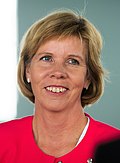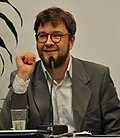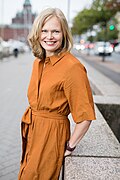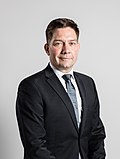Marin cabinet
| Marin cabinet | |
|---|---|
| 76. Cabinet of the Republic of Finland | |
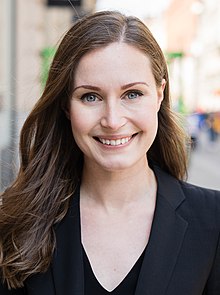
|
|
| Prime Minister | Sanna Marin |
| choice | 2019 |
| Legislative period | 38. |
| Appointed by | President Sauli Niinistö |
| education | December 10, 2019 |
| Duration | 0 years and 266 days |
| predecessor | Cabinet gutter |
| composition | |
| Party (s) | SDP , KESK , VIHR , VAS , RKP |
| representation | |
| Finnish Parliament | 117/200 |
| Opposition leader | Petteri Orpo ( KOK ) |
The Marin cabinet is the 76th and current cabinet in the Republic of Finland . It was appointed by President Sauli Niinistö on December 10, 2019 . The government succeeded the Rinne cabinet , which resigned on December 3, 2019 after a strike at the semi-public Finnish Post. Like the Rinne government, the cabinet consists of a coalition of SDP , KESK , VIHR , VAS and RKP . Prime Minister of the Cabinet is Sanna Marin .
Government formation
After Prime Minister Rinne backed the workers' demands on the occasion of a strike at the semi-state Finnish Post Office, the co-governing Center Party withdrew his trust. He then submitted his resignation and that of the entire government on December 3, 2019. President Sauli Niinistö asked him to remain in office until a successor was elected.
Election of the Prime Minister and appointment of the Cabinet
The Finnish Parliament elected Sanna Marin as the new Prime Minister on December 10, 2019. Subsequently, the new government was appointed by President Sauli Niinistö .
minister
The cabinet consists of 19 ministers. Seven of them are provided by the SDP, five by the Center Party, three belonged to the Green Bund, and the Left Alliance and the Swedish People's Party each provide two ministers.
| Office / department | photo | Surname | Political party | |
|---|---|---|---|---|
| Prime Minister |
Sanna Marin |
SDP | ||
|
Deputy Prime Minister Finance (since June 9, 2020) |
Matti Vanhanen | KESK | ||
|
Deputy Prime Minister Finance (until June 9, 2020) |
Katri Kulmuni | KESK | ||
| Outside | Pekka Haavisto | VIHR | ||
| Interior | Maria Ohisalo | VIHR | ||
| Foreign trade and development | Ville Skinnari | SDP | ||
| Judiciary | Anna-Maja Henriksson | RKP | ||
| job | Tuula Haatainen | SDP | ||
| defense | Antti Kaikkonen | KESK | ||
| Local authorities and administrative reforms | Sirpa Paatero | SDP | ||
| Transport and communication | Timo Harakka | SDP | ||
| education | Li Andersson | VAS | ||
| Europe | Tytti Tuppurainen | SDP | ||
| Culture and science | Hanna Kosonen | KESK | ||
| Environment and climate protection | Krista Mikkonen | VIHR | ||
| Agriculture | Jari Leppä | KESK | ||
| economy | Mika Lintila | KESK | ||
| Social and health | Aino-Kaisa Pekonen | VAS | ||
| Families and social services | Krista Kiuru | SDP | ||
| Nordic cooperation and equality | Thomas Blomqvist | RKP | ||
Government program
The government program, which has already been negotiated by the Rinne government, is 190 pages long and is called A Participatory and Knowledgeable Finland - a socially, economically and environmentally sustainable society . The government has indicated that it will not cut spending in its program and will increase its permanent spending by around 1.2 billion euros.
Employment rate of 75 percent
The government announced that it would increase the employment rate to 75 percent, which would mean 60,000 new jobs. A quarter of the government’s additional spending of 1.2 billion euros is expected to build on this increase in employment. According to Helsingin Sanomat , the funds described in the government program are "overwhelming". The government also wants more opportunities for hard workers, the elderly and immigrants, as well as the promotion of local agreements and early entry into higher education. According to Rinne, the unemployment rate should drop from over 6% to 4.8% and 30,000 new jobs should be in sight by 2020 in order to achieve the promised increases. According to Helsingin Sanomat, "employment is the most important measure taken by the Rinne government". In addition, the government would like to investigate the extension of earnings-related unemployment insurance to all those who meet the employment condition.
In a survey conducted by Taloustutkimus in June 2019, more than half of those surveyed did not believe that the economy will grow and that the number of employees will improve over the next four years.
household
The government has pledged to balance public finances by 2023. The goal can be deviated from if an economic crisis occurs in Europe. It was criticized that the government program hardly provided any preparations for the upcoming demographic change . Rinne announced that he wanted to raise pensions.
In the Taloustutkimus poll of June 2019, a fifth of the voters of the SDP and the Left Bund and 39 percent of the Greens questioned the sustainability of the government's economic base.
Tulevaisuusinvestoinnit
Tulevaisuusinvestoinnit (such as investing in the future ) is a plan for temporary additional investments of 3 billion euros in traditional government expenditures such as teacher recruitment and development cooperation. These additional costs will be funded through the sale of state-owned companies and real estate.
Taxes
Taxes are to be increased by 730 million euros. In contrast, income taxes for people with low and middle incomes are to be reduced by 200 million euros in order to offset the increase in indirect taxes. Taxes on fossil fuels , tobacco , alcohol and non-alcoholic beverages are also to be increased.
In a survey carried out in June 2019, 68 percent of respondents at least agreed that people with higher incomes should pay more taxes than at the time of the survey. 56 percent did not believe that inequality in Finland and income inequality had decreased by the end of the term. 67 percent of those questioned spoke out against a reduction in household allowances.
Migration and immigration
The upper limit is to be raised to 850 to 1050 refugees. People with a rejected asylum decision should in future be able to be equipped with an electronic ankle cuff .
environment
The industrial tax is calculated at the minimum allowed by the EU. The use of oil heating is to be discontinued at the beginning of the 2030s and the proportion of wind energy increased. Carbon sinks are said to be grown in forests, swamps and farmland. In addition, the government wants to increase the funds for nature conservation by 100 million euros per year. Furthermore, the welfare of the animals is to be improved through new hiking and biking trails.
equality
Violence and sexual offenses should be punished more severely. Violence against women should be punished as well as genital mutilation and forced marriage . In future, it should be possible to change the official gender entry independently of medical treatment (such as gender reassignment measures ).
Mothers and fathers should have the same length of parental leave . The support for home care should not be reduced.
In a survey carried out by Finnish entrepreneurs in June 2019, more than half of small and medium-sized enterprises were negative about extending paternity leave and around a quarter welcomed the reform.
Health and care
The government program provides for the recruitment of a thousand new doctors.
traffic
The government wants to expand the rail network between the major cities.
safety
300 new police positions are to be created.
Web links
Official website of the Finnish Government (English)
Individual evidence
- ↑ https://yle.fi/uutiset/osasto/news/finlands_new_government_sdp_centre_dominate_ministerial_portfolios/10813034
- ↑ https://www.hs.fi/politiikka/art-2000006128563.html
- ↑ https://www.kainuunsanomat.fi/artikkeli/antti-rinteen-hallitus-sai-eduskunnalta-luottamuksen-aanin-113-75-165244425/
- ↑ https://www.talouselama.fi/uutiset/sakn-ekonomisti-kiirehti-puolustamaan-rinteen-haukuttua-hallitusohjelmaa-lisaveroja-on-mahdollista-kerata/68300a0a-75dd-4607-a122-6c95b5b4bc88
- ↑ https://www.hs.fi/politiikka/art-2000006130220.html
- ↑ https://www.hs.fi/politiikka/art-2000006129100.html
- ↑ https://www.is.fi/politiikka/art-2000006140706.html
- ↑ https://www.hs.fi/politiikka/art-2000006130220.html
- ↑ https://www.is.fi/politiikka/art-2000006141832.html
- ↑ https://www.hs.fi/politiikka/art-2000006135669.html
- ↑ https://www.hs.fi/politiikka/art-2000006128563.html
- ↑ https://www.is.fi/politiikka/art-2000006140706.html
- ↑ https://www.hs.fi/politiikka/art-2000006128563.html
- ↑ https://www.hs.fi/politiikka/art-2000006128563.html
- ↑ https://www.hs.fi/politiikka/art-2000006128563.html
- ↑ https://www.hs.fi/politiikka/art-2000006128563.html
- ↑ https://www.maaseuduntulevaisuus.fi/kotimaa/artikkeli-1.450062
- ↑ https://www.hs.fi/politiikka/art-2000006128563.html
- ↑ https://www.hs.fi/politiikka/art-2000006135669.html
- ↑ https://www.hs.fi/politiikka/art-2000006135669.html






